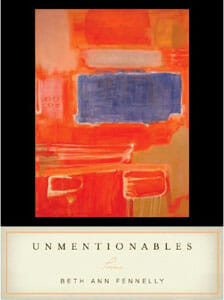
Hark! Paste‘s first-ever poetry review
Beth Ann Fennelly’s best poems are as noisy as a rat in a coffee can: They twitch, scramble and all but turn themselves inside out on the page. A classier way to put it is that the poems are over-determined, like dreams. Freud observed that dreams have more than one cause, which is what makes them action-packed; the same is true for poetry. In Fennelly’s best work, you get an entire bookful of images in just a page or two.
Unmentionables begins with “First Warm Day in a College Town,” in which a young female college professor (rather like Fennelly herself, who teaches at the University of Mississippi) checks out the fellows as they run by, shirtless; they’d be shortless, too, if she had her way. But the poem is not about lust—inappropriate or otherwise. The subject is aging, sand through the hourglass, time’s winge’d chariot hurrying near. This is a motif as old as the classic Greek and Roman poets, yet Fennelly makes it new by fast-forwarding between the present and the speaker’s childhood, as well as her wise, wistful future self.
A poem called “Cow Tipping” is a sketch of that sport so beloved by drunk adolescents with too much time on their hands and access to somnolent bovines. Yet Fennelly makes what could be a rueful one-note poem of regret into a searching examination of how trivial behavior leads to trivial politics and even terrorism.
“We’d Been Drinking Champagne When I Found It,” which comes right after “Cow Tipping,” ups the ante even more, mixing the approach of a hurricane with images of a cooking egg, a man and woman getting tipsy and the discovery of a lump in the woman’s breast—over-determined, indeed.
In the middle of Unmentionables, Fennelly dials things down considerably, like a singer/songwriter lulling the audience with a few ballads before the uptempo finale. There is a poem sequence in the voice of Impressionist painter Berthe Morisot and another that engages doomed poet John Berryman, who killed himself in 1972.
A 13-poem sequence called “The Kudzu Chronicles” grounds these high-art tours de force with vignettes of Southern mores: how, for example, a gaspy diva straight out of a Tennessee Williams play has to tell off a “pushy” Yankee young’un who doesn’t realize how important manners are on this side of the Mason-Dixon Line. Or the conversation with a neighbor in which he proposes to rid the region of the kudzu scourge by spraying the fast-growing plant with whiskey so the Baptists will eat it.
Less humorously, but still using her signature shuffle-step to best effect, Fennelly sketches herself doing a sexy, bourbon-boosted dance on stage at the Neshoba County Fair, only to reflect that, years earlier, the bodies of three murdered civil-rights activists were dumped nearby.
Perhaps these poems are so full of movement and color because, in many of them, the poet is trying to hammer out a truce between passion and domesticity, between a whirlwind libido and the need to put dinner on the table. (In real life, Fennelly is married to novelist Tom Franklin and has two children.) Thus “Of Two Minds” finds the poet getting a call from her first love; she’s happily married now, but the call is still unsettling, and the next thing you know, she and her ex are naked in a hotel room. Now, this never happened in real life. And this being a dream, the speaker’s husband and kids are also in that hotel, and they’re in some kind of danger. A baby cries out in the dream, but the speaker finds herself waking to the cries of her actual baby, called to her motherly duties yet unable to shake off the pungent memory of an event that never occurred.
The best poem in the book, “When Did You Know You Wanted to Be a Writer?,” comes near the end. Here a babysitter not only lets her boyfriend come over in flagrant violation of the unwritten Sitter’s Code of Ethics but looks on with devotion as her Romeo takes the speaker and her sister for motorcycle rides. Don’t tell your mom, the speaker warns, and a writer is born.
And then Unmentionables ends in an unexpected quiet. At first, “The Welcoming” seems out of place; it’s one of those poems that purrs rather than roars—it’s more a ballad than a rave. As its title suggests, though, it invites the reader not to exit noiselessly but to turn around and walk right back into Fennelly’s feast of light and sound and enjoy it all over again.
David Kirby’s latest collection is The House on Boulevard St.: New and Selected Poems. He was a finalist for the 2007 National Book Award in Poetry.